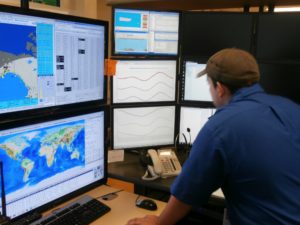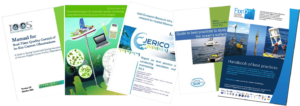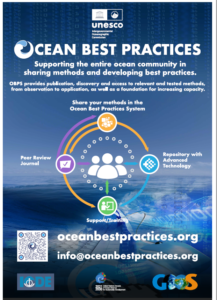Ocean Best Practices System (OBPS) is an Intergovernmental Oceanographic Commission service co-sponsored by the Global Ocean Observing System (GOOS) and the International Oceanographic Data and Information Exchange (IODE). It supports the JERICO Virtual Access (VA) scalable framework that provides visibility and access to JERICO-S3 resources.

OBPS accelerates the interoperability of ocean observations, convergence of methodologies and conventions for coastal observations by building balanced, evidence-based recommendations on contextualized practices and standards by facilitating:
(1 ) trusted protocols for creation, convergence and endorsement of practices and other standard methodologies,
(2) interoperability across coastal observations and data management and all dimensions of ocean stakeholders’ needs through propagation and linking of best practices, data and standards, and
(3) broad community engagement with sharing methods, creation and adoption of recommended practices and capacity development in their use.
The OBPS includes methods across the value-chain from observations to end users and their applications. This engages scientists, data managers and the ocean research community as well as users of ocean data and information and policy stakeholders.
Authors from across the multidisciplinary JERICO community entrust their valuable practical knowledge on how to study the ocean, to the OBPS FAIR aligned repository which is now a safe home for over 2000 records of diverse methods including the JERICO-developed best practices. OBPS brings to the VA greater visibility for the JERICO methods as the OBPS records are indexed by all major internet search engines and has also extended content discoverability through other modern data systems, such as the IODE”s Ocean Data and Information System (ODIS) (https://oceaninfohub.org/odis/). To support such discovery services, advanced natural language technology has been incorporated into the repository to improve coherent discovery of documents with diverse formats. Search and automated semantic indexing capabilities using authorized vocabularies, are extended into the document text to tag words and phrases via text mining and natural language processing techniques.
An important development has been defining a process by which users can gain insight from recognized expert panels on preferred practices. The work was done in collaboration with the IOC GOOS to define approaches for endorsing selected practices. In addition it offers multi-language support by the provision of machine translated versions (DE, FR, ES, PR) of these endorsed practices These are now identified and searchable in the OBPS repository as endorsed practices and are accessible through the JERICO VA.

In continuing developments, broader access to global methods is envisioned through OBPS becoming the nucleus of an Ocean Practices Federated Network (OPFN), contributing to the OBPS Ocean Practices for the Decade Programme of the UN Decade of Ocean Science for Sustainable Development. In addition, adaptation of best practices for use in local coastal observation systems will allow wider uptake of practices in communities with different infrastructure capabilities. A third area is greater inclusion of methods for end users and policy stakeholders of coastal information through active collaboration in the creation of a broader range of templates for methods documentation.
Making OBPS capabilities available for the evolving Digital Twin framework and architecture will be a focal point to support inclusion of coastal information and expanding interoperability for Digital Twins of the Ocean.


